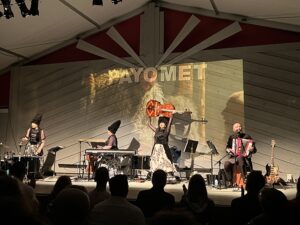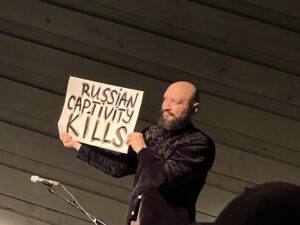There’s a game elementary students used to play, usually in P.E. class, stretched out on the grass or the polished wood of the gym floor. It involved a rainbow parachute, a circle of people gripping its circumference, and a willingness to mutually surrender to what came, what went, and however long the whole thing was going to last.

Arms lifted high and the parachute inflated. Arms dropped low and its center collapsed inward, fabric billowing out to the edge. Up and down, it went. But this was the best, most anticipated part: on cue from the teacher, each kid would lift the parachute up and over and behind, then sit on its edge to trap the air and create a sort of makeshift tent.
Enraptured by the blue-yellow-green-red sections of the parachute, they found unity outside time and space, exhilarated that they had created something transcendent, however temporary.
The June 30 performance by the Ukrainian band DakhaBrakha at Payomet Performing Arts Center in North Truro produced that same effect. Clinging to the rhythms of Carpathian rap, old folk songs, blues, jazz, and “ethno-techno,” many in the crowd, who couldn’t help but nod their heads, clap, or tap out the beat on a knee, slipped outside themselves, almost exultantly, toward something primal and undulating. The show got people to their feet and applauding at least five times.
Musicians Marko Halanevych, Iryna Kovalenko, Olena Tsybulska, and Nina Garenetska, who have collaborated for 20 years, bring a contemporary flair to the traditions of their homeland, from costuming to instrumentation. In old Ukrainian, “DakhaBrakha” means give/take. The members of the band represent the past, present, and future of Ukraine.
In this performance, reality was never far from view. For more than two hours, the specter of the ongoing Russo-Ukrainian war materialized variously in shouts of “Slava Ukraini!” (“Glory to Ukraine!”) and projections of photographs from the front and animations by Ukrainian artists on the wall behind the musicians: a seven-pointed rotating windmill, collecting energy; a waving field of wheat; an empty wooden vessel swinging on a rope between two wooden posts; a stumbling child, a monk, a shepherd, some sheep. There was also an auction at the end that raised $1,200 for Ukraine relief.
This was the third year that DakhaBrakha has performed at Payomet. Several Ukrainian flags could be spotted in the tent, which was filled nearly to capacity with more than 500 people.
Payomet Artistic Director Kevin Rice said that many in the crowd had seen the band perform before, with some — including groups of Ukrainians, Russians, and Poles — traveling from off Cape for the performance.
“In contrast to bombs dropping, you’re seeing this joyful, passionate, explosive music erupt from the stage,” said Rice. “One couple came up to me and said that this is the fifth time they have seen DakhaBrakha in three years. Very rarely will we have people come back to see the same performer three years in a row. It’s a testament to their power.”

The sonic and ambient tension between violence and vitality reached a kind of catharsis at one point toward the end of the show as clips of Ukrainian soldiers were projected on the wall. Amid the rubble of war, the soldiers smoked cigarettes, applied lip balm, played the violin in their barracks, and carried their flag through the street, raising it high and proud and undeterred. The visual display, by reflecting memory and urging persistence, underscored the message of the entire performance: amid horror, there is still life.



